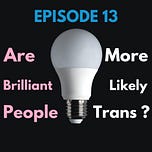Gifted and exceptional children seem more inclined to gender nonconformity and they represent a significant proportion of the ROGD teens discussed in Dr. Littman’s research. Sasha and Stella explore why there may be a link between brilliance and transgender identity.
Links:
“Where Overexcitability and Gender Dysphoria Meet,” by Jessie Mannisto
“Gender Identity and Overexcitability Profiles of Gifted College Students” Researchgate (2009)
Living with Intensity: Understanding the Sensitivity, Excitability, and the Emotional Development of Gifted Children, Adolescents, and Adults, Edited by Susan Daniels and Michael M. Piechowski
Cotton Wool Kids: What's Making Irish Parents Paranoid?, by Stella O'Malley
Extended Notes
How do the Irish reward/acknowledge/talk about “exceptional learners” and gifted individuals?
Educated American parents want to know how gifted their children really are.
Children who are exceptionally gifted will be placed in a different learning program to help them accelerate.
Kids can get set up with the expectation that they’re going to be exceptional all the time, and that leads to a lot of disappointment in life.
Why are gender dysphoria and “giftedness” linked?
How do you define a “gifted” person?
Sasha believes a lot of gifted people really struggle with depression in their teenage years as they see all their peers having fun and they “just can’t relate.”
It’s very lonely being intelligent.
Intense kids crave really deep relationships and are dissatisfied by superficial relationships that are very common during the teenage years.
Stella has noticed that a lot of teens aren’t “that into” music anymore. It used to be a huge part of her identity when she was growing up.
If you have a growth mindset, you’re able to handle failure much easily.
Everyone in life is “in a process.” Nobody starts out great.
Do you have a fear of failure? It's a very common experience!
Companies are savvy and they want you to get excited, emotionally, so that there’s more engagement on their platforms.
It’s common for teenagers to have a big sense of imaginability, but these can really go “off the rails,” so to speak, with brilliantly gifted kids.
What’s concerning is children taking on more video games instead of going outside and being physical to expend all that energy. It impacts your health and your brain.
Life is safer for our children today than ever before, but at what cost?
If you’re not pushing your body beyond its limits, what’s next? You’re pushing your brain and you’ll seek more and more dangerous behavior online.
In gifted education, there is a desire to discover new ideas and gender identity is so cutting edge.
This podcast is partially sponsored by ReIME, Rethink Identity Medicine Ethics:
Learn more about our show: Linktr.ee/WiderLensPod











